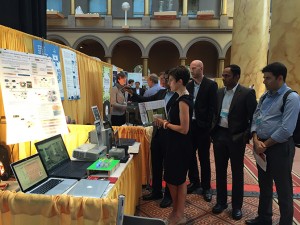
Part of $40 million White House Smart Cities Initiative
A team of researchers from the Department of Electrical and Computer Engineering at Iowa State University was awarded one of 12 Global City Teams Challenge (GCTC) research projects by the National Science Foundation this week. The GCTC, a joint initiative of the National Institute of Standards and Technology (NIST) and US Ignite, is designed to showcase smart technologies with the potential to transform cities and communities around the world. The projects were announced at a White House event that kicked off the first-ever Smart Cities Week.
The ISU team has developed an integrated testbed platform that provides cyber/physical attack-defense training for critical infrastructure stakeholders. CyDECS: Cyber Defense Exercise for Critical Infrastructure Security, was first showcased at the GCTC Expo held in the National Building Museum in Washington D.C., June 1. Manimaran Govindarasu, Mehl Professor of engineering and Associate Chair of ECpE, is leading the team developing the project.
“The team has built a virtual testbed platform, with hardware-in-the-loop capabilities, that can mimic cyberattacks and defenses on physical systems, like the power grid.” Govindarasu said. “We can’t practice attacks on real systems without causing actual damage, so a virtual testbed environment is the way to go.” He added, “This platform will significantly advance the cyber security training capabilities for critical infrastructure owners and first responders by transitioning the current ‘table-top’ exercise to a more realistic testbed-based training experience.”
The project, designed to replicate physical infrastructure like the power grid in a digital space, is partially funded by the Department of Homeland Security (DHS). The team is collaborating with researchers at the University of Southern California and Washington State University and has partnered with the Iowa Air National Guard to further the project. The team also is exploring collaborative opportunities with North American Electric Reliability Corporation (NERC) to organize training programs for electric utilities. The team isn’t just focused on electric utilities, however.
“It’s not just the power grid that we have to take into account,” Govindarasu says. “There are so many smart devices out there connected to the internet, and that number will only go up.
He’s talking about the Internet of Things (IoT), a network of machines, devices and objects that feature microcontrollers, sensors, actuators, and software that connect them to the internet. For example, soon nearly every appliance, including washing machines and refrigerators, will ship with software that enables an internet connection. With everything connected to a network, the risk posed by hackers will only increase.
“Right now, hackers are mainly focused on identity theft and credit card fraud,” said Doug Jacobson, University Professor of engineering, director of the Information Assurance Center at Iowa State, and member of the CyDECS team. “In the near future, a hacker could presumably break into your home network and take control of everything. Your washing machine, your thermostat, your lights. They could cause physical damage that way.”
Through the GCTC, more than 50 forward-looking cities and communities have partnered with private organizations, universities and not-for-profit organizations to accelerate the deployment of IoT technologies designed to address some of the most pressing challenges facing local communities.